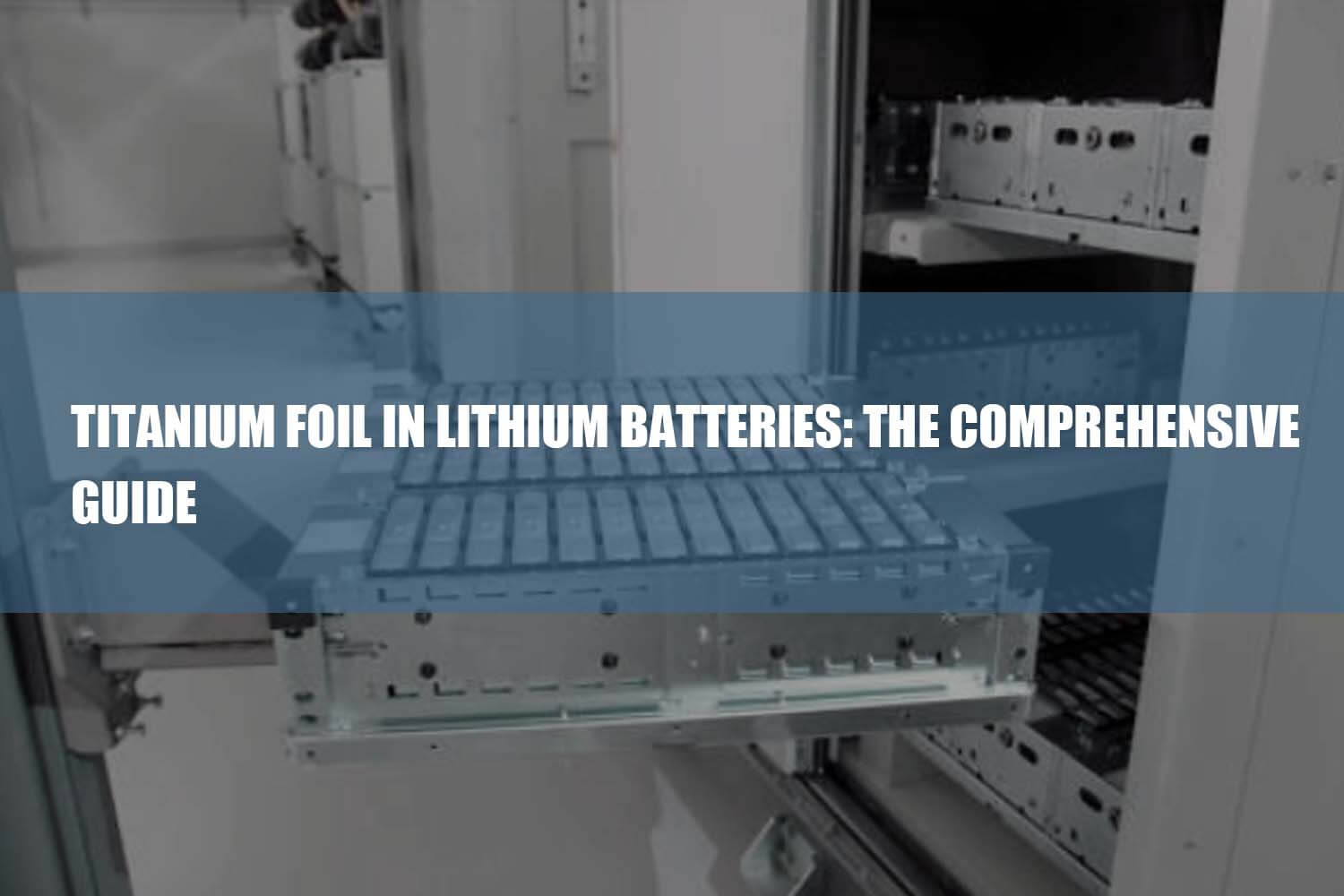Titanium foils have excellent features like high tensile strength, corrosion resistance, and lightweight. Due to these properties, titanium foils are mostly used in lithium batteries production industry.
Titanium foils are also used in catalysis applications, solar cells, and in the batteries of small electronics applications like mobile, tablets, and drones.
Generally, lithium batteries have four main components anode, cathode, electrolyte, and separator.
Every component of a lithium battery is very important; if any element is missing, no chemical reaction occurs in the battery, and the battery does not work correctly.
A lithium battery has two electrodes: a negative charge electrode called the anode and a positive electrode called the cathode.
A lithium battery is a rechargeable battery that is charged and discharged by moving lithium ions between the anode and cathode.
Let’s keep reading.
What are lithium batteries use titanium foils?
Titanium foils are made from titanium or titanium alloys by industries’ hot and cold rolling processes.
There are many applications for titanium foils. Lithium battery is one most important applications of titanium foils.
When high rate, extended cycle life, and excellent efficiency are required, lithium-ion batteries frequently use titanium foil as the anode due to their outstanding electrochemical stability.
An electrode constructed of positively charged titanium is known as a titanium anode.
The atomic number 22 and the chemical symbol of titanium are Ti. When moving, the electrodes emerging from a titanium anode provide an electrical current to a metallic surface.
Which grade of titanium foil is used for lithium batteries?
99.9% purity titanium (ti) foil is used for lithium batteries.
One of the most favorable anode choices for lithium-ion batteries among these transition metal oxides is TiO2 titanium dioxide, which has high discharge voltage, excellent cycling stability, is
environmentally friendly, is highly safe, and is inexpensive.
Titanium dioxide is a polymorph material with four stable states: anatase, rutile, brookite, and monoclinic.
The monoclinic state is also called TiO2-B. This grade of titanium dioxide is the best grade for lithium-ion batteries than others.
Materials made with TiO2 (Titanium dioxide) have received much attention in photocatalysis, sensors, and solar cells.
In addition, TiO2-based materials, particularly rechargeable lithium-ion batteries, are highly desirable for energy storage and conversion devices like lithium-ion batteries.
Due to its narrow pathways for quick lithium ion diffusion, and wide exposed surface enabling more lithium insertion channels, TiO2 (Titanium dioxide) offers a significant advantage.
Why titanium foils are so popular in the lithium batteries manufacturing process?
On titanium foil, aligned single-crystalline TiO2 (Titanium dioxide) nanowire arrays were grown over the huge area using a straightforward, ecologically friendly three-step hydrothermal process.
These titanium foil nanowire arrays have specific capacities of 200–250 mAh/g at charge-discharge rates of 0.3 C, where 1 C is based on the particular capacity of 168 mAh/g. They are appropriate to be used as the anode in lithium-ion batteries.
This titanium foils Batteries maintain this capacity for up to 200 charge-discharge cycles. The nanowires’ nanoscale size and directed alignment are credited with these qualities.
These TiO2 nanowires on titanium foil appear promising anode materials for large-scale energy storage due to their comparable electrochemical performance to currently available technology, increased safety, and capacity to roll titanium foils into compact three-dimensional structures without the use of additional substrates, binders, or additives.
What are the advantages/disadvantages of using titanium foils vs. stainless steel foils in lithium batteries?
Stainless steel foils and titanium foils are both widely used by various consumers. Both are used in lithium batteries and many other industrial applications.
The electrochemical stability of titanium foils is 736, and the stability of stainless steel foils is 786 in lithium batteries.
Compared to stainless steel foils, titanium foils are stronger and lighter in weight.
Titanium foils have a large corrosion resistance, making them ideal for their application in lithium batteries.
Titanium foils can resist stress more than stainless steel foils during internal attachment because of their superior strength under repeated loads.
Titanium foils are less rigid than stainless steel foils and have a lower modulus of elasticity while working in lithium batteries.
The stainless steel and titanium foils did not cause alloy formation with Lithium at low potentials close to 0 in lithium-ion batteries. Steel foils frequently deform more slowly than titanium foils.
Stainless steel foils can be coated with a thin metal finishing technique to lessen the chemical reactivity of its surface.
When it comes to metal plating, titanium foils can be electroplated, for instance, by adding platinum to enhance their appearance.
How to manufacture one roll of titanium foil in the lithium batteries industry?
The Kroll Process is the primary method used to produce titanium foils for a lithium battery.
The primary mineral, rutile, is processed with chlorine gas in this method to create titanium tetrachloride.
The reaction with magnesium or salt then purifies and reduces this to a metallic titanium sponge. The titanium sponge is subsequently alloyed and melted.
This sponge is melted, then rolled, flattened, and cut into titanium sheets with specified or particular requirements to manufacture titanium foils for lithium batteries.
To create titanium foils, these titanium sheets are cold-rolled after being annealed.
The thickness and width can be maintained according to the customer’s needs.
How to buy titanium foils for your lithium batteries projects?
While buying titanium foils for lithium batteries, you first need to search for a good and reliable metal strip foil manufacturer that makes the best quality.
Remember the required thickness, width and specific grade of titanium foils for your lithium batteries project.
Conclusion
There are many applications of titanium foils in industries and daily life.
Titanium foils are corrosion-resistant and have electrical conductivity and a high strength-to-weight ratio.
Due to these properties, one of the best use of titanium foils is making lithium batteries with titanium foils.












